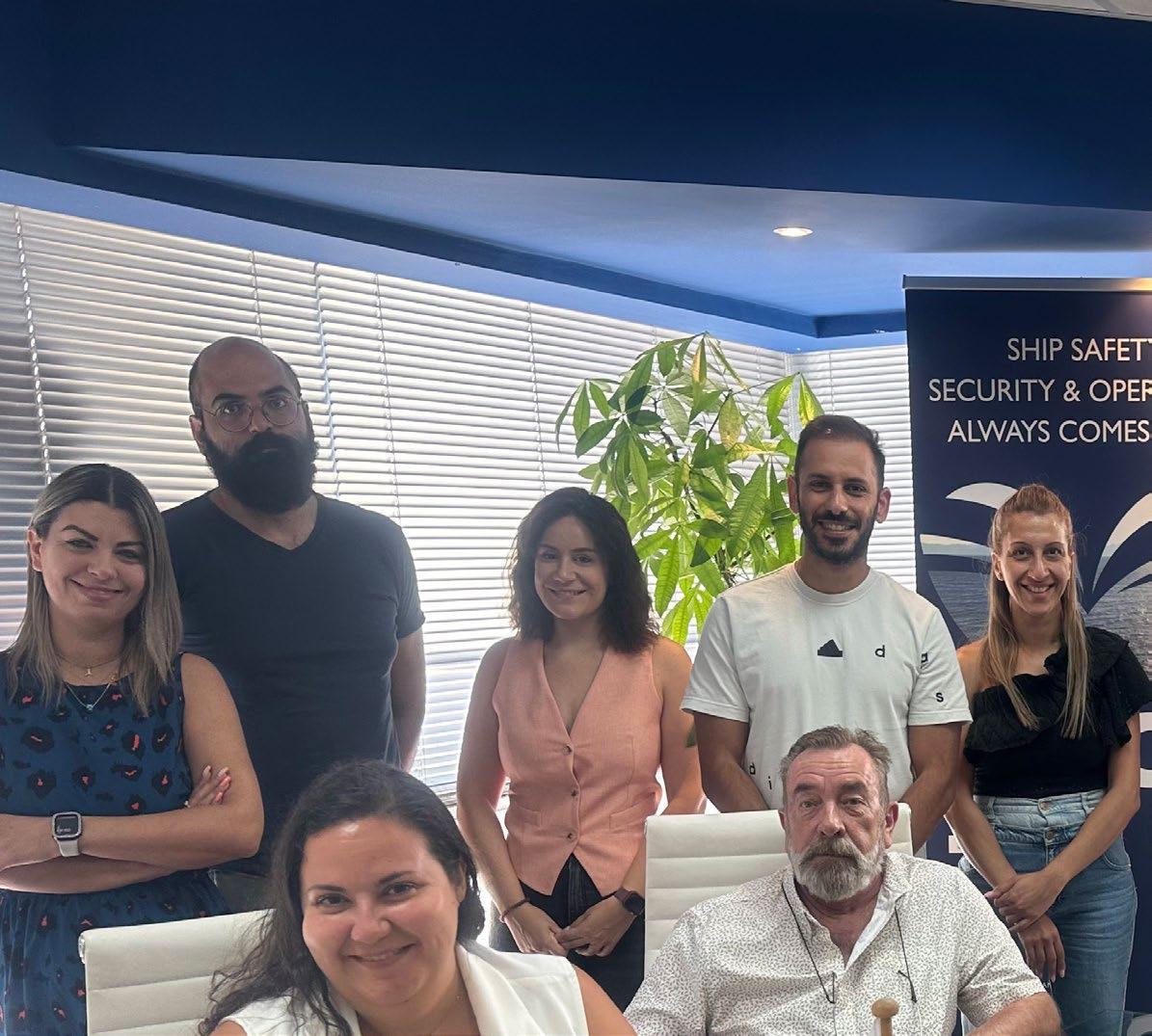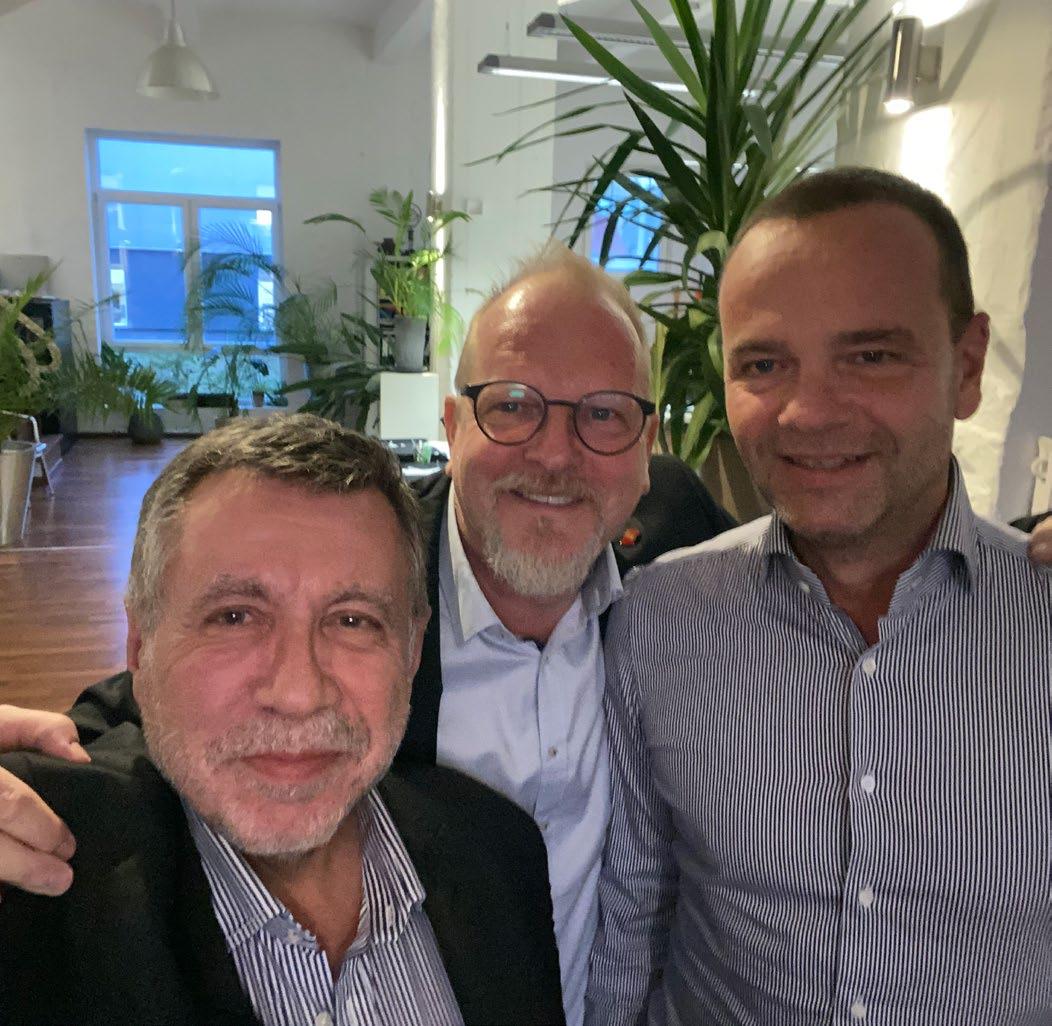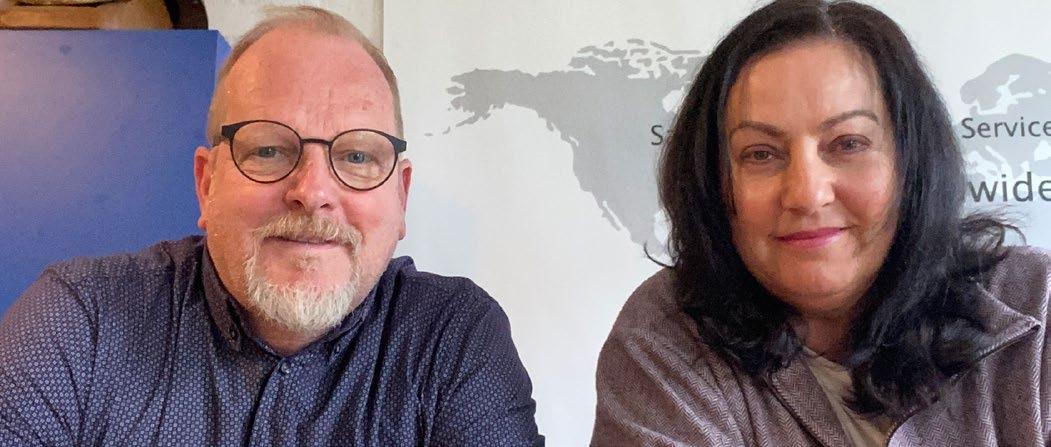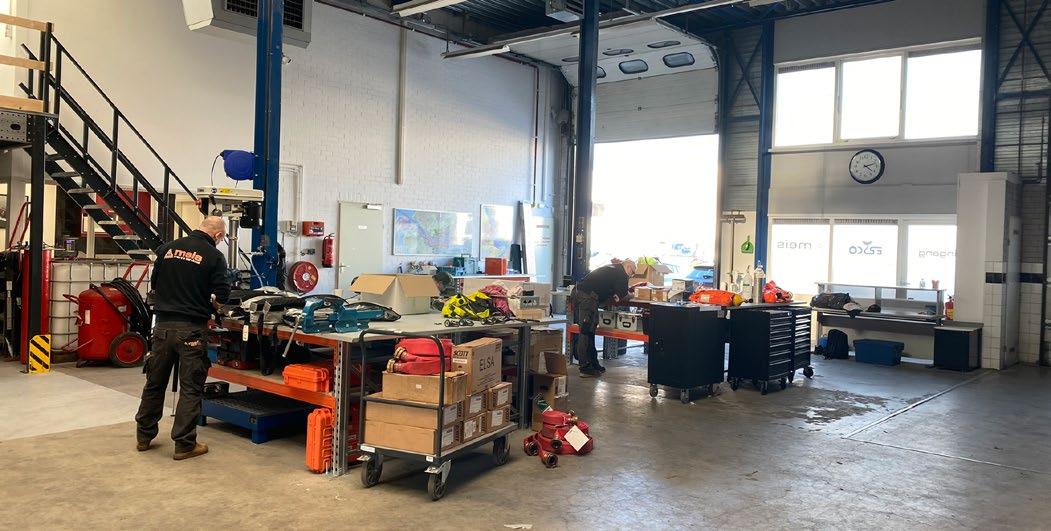
Ship Safety, Security and Operation Always Comes First!


Ship Safety, Security and Operation Always Comes First!


In this insightful interview, Andreas Ioannou, Owner of EPSCO Group, shares his journey and the core principles that have driven the company since its inception in 1995. With nearly three decades of experience in the maritime safety and service industry, Andreas reflects on the challenges and milestones that have shaped EPSCO into a leading provider of global fleet safety services. He discusses the company’s innovative approaches to client relationships, technological integration, and sustainability initiatives, all while maintaining a commitment to exceptional service. As EPSCO approaches its 30th anniversary, Andreas outlines his strategic vision for the future and the steps being taken to navigate the evolving maritime landscape.

Can you share the story behind the founding of EPSCO Group in 1995 and what inspired you to establish the company?
I was working for a major marine supplier in the early 90s but felt unhappy in what I perceived as a stifling corporate environment, where the bottom line was prioritised over providing excellent service. A turning point for me occurred during a customer visit when a superintendent shouted at me from across their office, stating that it had cost them less to fly a team from the UK to Rotterdam than to use our local service team for a safety inspection.This incident made me realise that I should be providing solutions that benefit my customers rather than merely selling a product.
I left that position and set up EPSCO in January 1995. I am not ashamed to admit that the first couple of years were incredibly tough. I had a tiny office, a fax machine, and a PC. I could not afford air conditioning, and as you may know, summers in Cyprus can get very hot. So, I spent every day going out and knocking on doors. I had relationships with customers, but I had to prove that I could deliver on my promises, and it took time to gain their trust. Thirty years later, we have a team of about 32 people, four offices, and our own FFE servicing facilities in Rotterdam.
EPSCO Group will soon complete 30 years. What have been some of the greatest milestones and achievements for the company over the years?
We were one of the first companies in the industry to introduce the concept of fixed fee fleet agreements for safety services in 2007. Since then, we have been imitated by much larger companies, but none have maintained the simplicity and effectiveness that we offer.
In 2008 and 2009, we opened our own sales offices in Hamburg and Singapore, respectively. In 2021, we made a significant investment in our own service facilities and sales office in Rotterdam, completing a 100% takeover this year.
In the past year, we have also undertaken a complete overhaul of all our management systems, which has provided us with much better control and oversight of our operations, allowing us to enhance our service to customers.

Your Global Fleet Safety Service Agreements are a significant part of your offerings. How do these agreements benefit your clients in terms of safety, efficiency, and cost-effectiveness?
It’s said that safety constitutes 1% of the budget but generates 95% of the headaches. Clients may have to arrange for BA Sets to be inspected in one port, fire extinguishers in another, and CO2 inspections elsewhere, among other tasks. This incurs costs not only in terms of pricing, transport, and overtime but also in the time they spend coordinating these services instead of focusing on their core operations.
We alleviate that headache for our clients, allowing them to concentrate on more pressing matters.
As mentioned earlier, we were one of the first companies to introduce this concept, born out of a desire to simplify safety services. Our agreement provides customers with a single price anywhere in the world, enabling effective budgeting while harmonising all their certifications by minimising the number of service calls required.
Additionally, we manage all service reminders and maintain all certificates on their behalf. Clients can access this information through our secure servers, where they can view service dates, check what services we have completed, and download certificates at their convenience.
Our Global Fleet Safety Agreements are designed to be straightforward, with no hidden clauses!
How does EPSCO integrate new technologies, particularly in cybersecurity and marine safety, to stay ahead of industry trends and ensure the highest standards of safety?
We have invested significantly in improving and automating our management systems, providing us with a comprehensive view of customer preferences and buying trends to better assess their needs. Additionally, we have implemented regular penetration testing as part of our cybersecurity regime to identify and address any vulnerabilities within our systems, ensuring they are resilient against the latest attack techniques.
We also pay close attention to all SOLAS/IMO updates and ensure our customers are kept informed about these changes.
In terms of marine safety, our senior personnel maintain constant communication with manufacturers and developers of safety products to stay abreast of new innovative offerings. We anticipate bringing a couple of major developments to market in the upcoming year.
What sustainability practices has EPSCO implemented to reduce environmental impact, and how do these initiatives align with global maritime regulations?
In today’s business world, being environmentally friendly and socially responsible is more important than ever. At EPSCO, we are working hard to make a positive impact, focusing on both environmental sustainability and community involvement. Our company is committed to reducing our environmental footprint and has implemented a range of green practices. These include a target of becoming paperless, boosting energy efficiency, expanding recycling programs, and reducing carbon emissions through the use of mild hybrid company cars.
Since the pandemic, we have limited our travel and decided to continue this practice as much as possible by holding online meetings rather than flying, except when absolutely necessary. One of our key goals is to achieve a zero-waste operation, further reducing our carbon footprint.
A significant part of this effort involves partnering with suppliers who also prioritise sustainability. By choosing eco-friendly packaging and encouraging a circular economy, we work collaboratively with our suppliers to minimise waste and tackle issues like plastic pollution and climate change.EPSCO is also a member of CYMEPA (Cyprus Marine Environmental Association) and supports all their locally based activities.
Our dedication extends beyond environmental issues. We actively participate in and support various charitable initiatives. Employees volunteer for local events, such as the Distinguished Gentleman’s Motorbike Ride for Prostate Cancer, blood donation drives, and work at animal shelters. We also donate all safety equipment and clothing required by a local volunteer firefighting team engaged in combating forest fires here in Cyprus, and we participate in community events such as the IMarEST clay shooting day.These efforts contribute to creating a positive and supportive work environment where employees feel proud of their company’s impact.
Additionally, as part of our commitment to reducing environmental impact in our sales activities, we have taken on the representation of a UK-based company, Sonihull, which produces ultrasonic antifouling systems. These systems assist vessels in saving fuel, reducing CO2 emissions, minimising the need for biocides, and preventing invasive species from being transported to other regions through 100% green technology. Ethical business practices are a priority for me personally. I value honesty and fairness in all our dealings and expect the same from our partners. This commitment to doing the right thing has earned EPSCO a reputation as a responsible and respected business.

How does EPSCO approach employee training and development, and what initiatives are in place to ensure the welfare and growth of your staff?
At EPSCO, we recognise that staff development and employee welfare have a direct impact on productivity. A company, any company, is nothing without its people.
We encourage ongoing mentorship and coaching for our newer team members, as well as the coordination of one-on-one meetings to keep communication open and honest.
Some of our key initiatives include in-house presentations and training from our resident fire services expert, regular team meetings to discuss any questions or issues, trips to supplier facilities, and visits to exhibitions and conferences. We also encourage our team to participate in maritime events and to take memberships in organisations such as WISTA or YoungShip.
To further support our staff’s well-being, we arrange regular team-building events, social gatherings, and informal evenings out for drinks, all aimed at boosting morale.
Given the nature of our industry, our team must be available 24/7. Therefore, we offer flexibility with working hours and remote working arrangements to ensure that our employees’ family obligations are met.
EPSCO services approximately 3500-4000 vessels annually. How do you maintain strong relationships with your clients and ensure their needs are consistently met?
With a global network of service centres and partners, we can support our clients wherever their ships are located. This extensive reach ensures that we provide consistent service across different regions.
We have purposefully remained a small, proactive, and agile outfit. We prioritise our customers’ needs far more than simply “selling services.” Regular contact with our clients, whether through visits or online meetings, is essential. We frequently ask for their feedback on how we can improve our service offerings. This proactive approach helps us stay attuned to their evolving needs and preferences.
Each customer is assigned a dedicated account manager who serves as their primary point of contact. This ensures personalised service and a deep understanding of each client’s specific requirements.
Our fleet agreements are not a “one size fits all.” We tailor our agreements to meet the unique needs of each client, ensuring that we provide solutions that are both effective and efficient. This customisation helps build trust and fosters long-term partnerships.
We understand the importance of timely service in the maritime industry. Our processes are designed to be efficient and reliable, ensuring we consistently meet our clients’ schedules and deadlines.
“Information is king.” We maintain clear and open communication channels with our clients, providing them with regular updates on the status of their services. This transparency builds trust and ensures clients are always informed.
Finally, from a personal point of view, maintaining personal contact with our customers is crucial. Being available to take a call at any time and discussing any concerns directly, rather than relying solely on email, is important to me.

What are the biggest challenges facing the maritime safety and service industry today, and how is EPSCO addressing these challenges?
There are several challenges currently facing the maritime safety and service industry, including the prevailing geopolitical climate. Ongoing geopolitical tensions significantly impact global trade and maritime operations. To navigate these complexities, we stay agile by closely monitoring developments and adapting our strategies accordingly.
The maritime industry is highly regulated, with stringent international, regional, and national regulations that are constantly evolving. At EPSCO, we ensure that we stay updated on the latest maritime regulations, which allows us to maintain compliance across our services and solutions. We have implemented robust compliance management systems to effectively monitor and manage regulatory requirements.
Another major challenge is the increasing digitalisation of maritime operations, which makes the industry more vulnerable to cyberattacks that can compromise safety and operational efficiency. As mentioned earlier, we conduct regular penetration tests on our systems to ensure they are resilient against potential attacks.
Additionally, we face challenges in remaining competitive amidst rising costs, increased competition (some of which may not adhere to ethical practices), and price pressures from ship management companies. We strive to remain as cost-effective as possible by continually improving our processes to enhance efficiency.
However, we believe there is inherent value in the services we provide. We refuse to compromise on quality, and while we do our best to be competitive, we do not claim, nor do we aspire to be the cheapest option. We will not cut corners, nor will we partner with any entity that engages in such practices.


What are your strategic goals for EPSCO Group in the next five to ten years, and how do you plan to achieve these goals while continuing to innovate and expand your services?
Our goal is to continually improve our operations, and we plan to open more of our own servicing facilities in various regions over the next few years. This expansion will provide us with tighter control over the quality of service we deliver, a success demonstrated by our station in Rotterdam over the past three years.
Additionally, we will focus on innovative and sustainable new technologies that enhance safety on board. By integrating these advancements into our service and supply offerings, we aim to differentiate ourselves from our competitors.

EPSCO (Cyprus) Ltd. offers global marine safety and technical services, including lifeboat inspections, diving operations, and dry-docking solutions. With a network of over 350 service stations, EPSCO ensures compliance with international maritime standards.